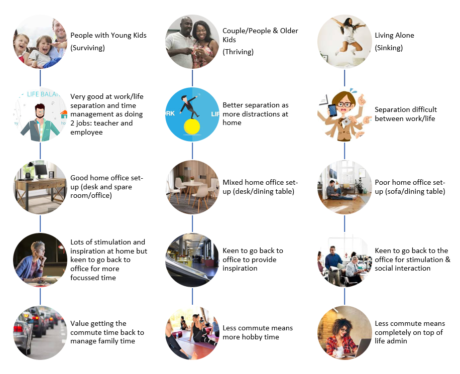During the enforced lockdown period, just like everyone else, Colart had to adjust working practices and things that would have seemed impossible before, have become common practice. As businesses start to go back to the office, we’ve been looking at what can be kept from this experience and bring in to the ‘normal’ ways of working.
The start point was to ask the people. We surveyed the business and conducted focus groups to get a deeper understanding of what was working well and what was not. This helped to identify common needs to build a new normal that combined the benefits of the lockdown with the benefits of the old normal.
What was common, and has been well documented in other views, was that no-one wanted to go back to 5 days per week in the office. Everyone is looking for a better mix, all for different reasons.
Groups
The research uncovered three distinct groups of people: People with Young children (Y6 School Children and under), those Living Alone and Couples living together or with older children (Y7 and up). Each group was coping differently with enforced home working and evidently had very different experiences.
There were also some similarities with the main influence being that personal life and working life are shaping each other more than in the past with the ‘Office Clock’ disappearing.
Other similarities include:
They all like the extra time at home and want to keep this, to an extent.
They all missed human interaction in the workplace so want to be in the office 1/2 days per week, albeit for different reasons.
They all felt they had a good connection with their immediate team but missed the wider company family feeling gained by the spontaneous ‘Water Cooler’ moments.
So what next?
It’s become obvious that it’s more important than ever to connect people to keep the company culture alive. At Colart, we have worked hard to do this through open and regular communication and introducing new tools. This needs to be thought through a virtual lens and can be as simple as running clubs and cycling clubs that have no geographical boundaries but are connected via an app and exercise distance/time measurement (or even exercising at the same time to the same music).
As the three different groups work in different ways, there is a need for more line managers tools to manage people remotely with collaboration, communication and connectivity featuring strongly and because people are having different experiences, mental health at the forefront of thinking.
The office space is set to become a more collaborative workplace with the space outside of the office, such as homeworking becoming the space for concentration or quiet reflection. This agile and flexible working should improve not only productivity but also everyone’s work/life balance and satisfaction.

